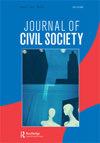Nonprofit advocacy in Russia’s regions
IF 0.9
Q3 POLITICAL SCIENCE
引用次数: 3
Abstract
ABSTRACT How do nonprofit organizations (NPOs) engage in advocacy in closed political regimes? This article studies nonprofit advocacy in Russia by focusing on strategies and explanatory factors. We argue that Russian NPOs rely on collaborative rather than confrontational strategies. They use official channels, personal contact with state officials, strategies for resource exchange and evidence-based advocacy. Based on empirical research in eight regions, we show that nonprofit advocacy depends on both external (contextual) and internal (organizational) factors. NPOs have greater opportunity to engage in advocacy when the subnational institutional context and the policy field allow for their active participation in policy formation and implementation. Moreover, NPOs are more successful in their advocacy when they strategically use their capabilities (e.g., knowledge, expertise and skills) and emphasize mutual trust, loyalty and readiness to compromise. Our findings point to the relevance of collaborative forms of advocacy, particularly in constrained political environments such as Russia.俄罗斯地区的非营利倡导
在封闭的政治体制下,非营利组织(NPOs)如何参与倡导?本文从策略和解释因素两个方面对俄罗斯的非营利倡导进行了研究。我们认为,俄罗斯非营利组织依赖于合作而不是对抗战略。他们利用官方渠道、与国家官员的个人接触、资源交换策略和循证倡导。基于八个地区的实证研究,我们发现非营利组织的倡导既取决于外部(情境)因素,也取决于内部(组织)因素。当国家以下的体制环境和政策领域允许本国专业人员积极参与政策的制定和执行时,本国专业人员就有更大的机会从事宣传工作。此外,当非营利组织战略性地利用其能力(如知识、专业知识和技能)并强调相互信任、忠诚和愿意妥协时,他们的倡导更成功。我们的研究结果指出了合作形式的宣传的相关性,特别是在俄罗斯等受限制的政治环境中。
本文章由计算机程序翻译,如有差异,请以英文原文为准。
求助全文
约1分钟内获得全文
求助全文

 求助内容:
求助内容: 应助结果提醒方式:
应助结果提醒方式:


